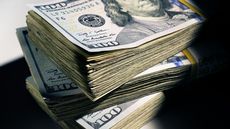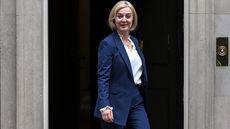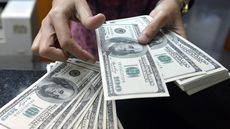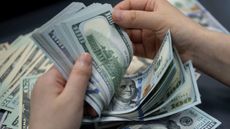Sterling accelerates its recovery after chancellor’s U-turn on taxes
The pound has recovered after Kwasi Kwarteng U-turned on abolishing the top rate of income tax. Saloni Sardana explains what's going on..
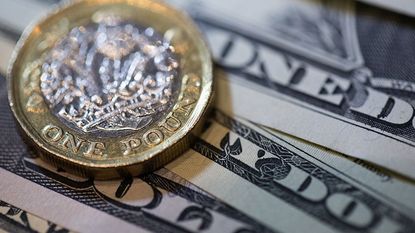

Sterling touched a two-week high against the dollar today after chancellor Kwasi Kwarteng backtracked on plans to scrap the 45p income-tax rate on Monday.
The decision to axe the additional rate of income tax caused a storm in the markets, forcing the Bank of England to ride to the rescue. Sterling fell to a low of $1.0384 on 26 September just days after the mini-Budget and government bond yields surged to levels not seen in over a decade.
However, earlier today sterling briefly touched $1.14 and government bond yields have returned to levels seen before the chancellor’s so-called mini-Budget.
Subscribe to MoneyWeek
Subscribe to MoneyWeek today and get your first six magazine issues absolutely FREE

Sign up to Money Morning
Don't miss the latest investment and personal finances news, market analysis, plus money-saving tips with our free twice-daily newsletter
Don't miss the latest investment and personal finances news, market analysis, plus money-saving tips with our free twice-daily newsletter
Why the U-turn is helping sterling
Thanim Islam, market strategist at international business payments specialist Equals Money, said sterling is higher as the chancellor’s U-turn has lowered interest rate hike expectations.
“Chancellor Kwasi Kwarteng has confirmed that the government will not be proceeding with the 45% tax rate. Sterling has risen off the back of the news, and markets have pared back interest rate hike expectations. November's expectation is now for a 1.25% with a further 1% hike in December,” Islam said.
The Bank of England’s emergency intervention to stabilise markets has also helped improve sentiment. Last week the central bank announced it will spend up to £65bn – £5bn every weekday until 14 October.
It is, it said, ready to purchase “conventional gilts with a residual maturity of more than 20 years in the secondary market, initially at a rate of up to £5bn per auction. These parameters will be kept under review in light of prevailing market conditions.”
Are these measures enough to reverse sterling’s slide?
Despite the government’s U-turn, most market watchers believe sterling will remain under pressure due to the headwinds facing the UK economy and the country’s growing debts.
"We do not see today's announcement by the UK chancellor as a game changer for sterling,” said Vasileois Gkionakis, head of Citi’s European FX strategy.
"The borrowing path trajectory will barely change and the big issues at play (unsustainability, higher risk premium) remain in place in our view,” he added.
How will a weaker pound affect you?
Weaker sterling and a higher dollar make the cost of imports more expensive and will raise prices at a time when all Britons are grappling with a cost of living crisis.
Philip Dragoumis, the owner of London-based Thera Wealth Manager, says, “If foreign investors lose confidence in the country, its government and economy, which is happening at scale, sterling could fall much further and the fallout will be devastating. This will keep inflation higher for longer and growth lower.”
Sarah Coles, senior personal finance analyst at Hargreaves Lansdown, said: “The plunging pound is effectively picking our pockets and making us poorer. The market reaction to the tax and spending plans announced on Friday will have a profound impact on everything from the cost of filling up the car and supermarket prices to debt repayments and the value of our savings.
Saloni is a web writer for MoneyWeek focusing on personal finance and global financial markets. Her work has appeared in FTAdviser (part of the Financial Times), Business Insider and City A.M, among other publications. She holds a masters in international journalism from City, University of London.
Follow her on Twitter at @sardana_saloni
-
-
 Investment trust discounts hit 2008 levels. Here’s how to profit
Investment trust discounts hit 2008 levels. Here’s how to profitInvestment trust discounts have risen to levels not seen since 2008, here are three trusts looking to buy to profit.
By Rupert Hargreaves Published
-
 A luxury stock to buy at a high street price
A luxury stock to buy at a high street priceInvestors wrongly consider Watches of Switzerland a high-street outlet.
By Dr Matthew Partridge Published
-
 Why you should keep an eye on the US dollar, the most important price in the world
Why you should keep an eye on the US dollar, the most important price in the worldAdvice The US dollar is the most important asset in the world, dictating the prices of vital commodities. Where it goes next will determine the outlook for the global economy says Dominic Frisby.
By Dominic Frisby Published
-
 Will Liz Truss as PM mark a turning point for the pound?
Will Liz Truss as PM mark a turning point for the pound?Analysis The pound is at its lowest since 1985. But a new government often markets a turning point, says Dominic Frisby. Here, he looks at where sterling might go from here.
By Dominic Frisby Published
-
 Are we heading for a sterling crisis?
Are we heading for a sterling crisis?News The pound sliding against the dollar and the euro is symbolic of the UK's economic weakness and a sign that overseas investors losing confidence in the country.
By Alex Rankine Published
-
 The US dollar is rising to dangerous levels – here’s what to do about it
The US dollar is rising to dangerous levels – here’s what to do about itAnalysis The US dollar is back on the rise as panicky investors head for safety. That’s rattling markets across the world, says Dominic Frisby. Here’s how to cope.
By Dominic Frisby Published
-
 Investors dash into the US dollar
Investors dash into the US dollarNews The value of the US dollar has soared as investors pile in. The euro has hit parity, while the Japanese yen and the Swedish krona have fared even worse.
By Alex Rankine Published
-
 Why a strong dollar hurts – and what you can do about it
Why a strong dollar hurts – and what you can do about itAnalysis The US dollar is at its strongest level in 20 years. That’s bad news for most investment assets, says John Stepek – here’s why
By John Stepek Published
-
 Can anything stop the dollar’s devastating bull run?
Can anything stop the dollar’s devastating bull run?Analysis The US dollar has been on a massive bull run for the last year or so. Commodity prices are sliding, and the euro – maybe even the pound – could hit parity. But when it turns there will be mad scramble, says Dominic Frisby. Here, he looks at what might halt the runaway dollar.
By Dominic Frisby Published
-
 Shrinking credibility leaves sterling resembling an emerging-market currency
Shrinking credibility leaves sterling resembling an emerging-market currencyNews UK monetary policy and the effects of Brexit are undermining confidence in sterling – it is increasingly resembling an emerging-market currency.
By Alex Rankine Published


